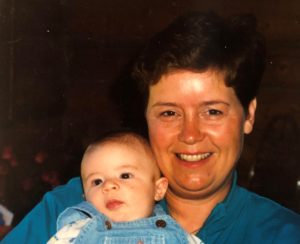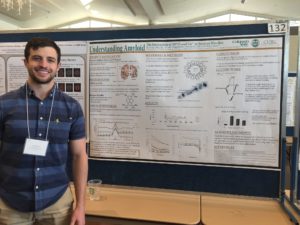by Jackson McCue
Jackson McCue graduated from Colorado State University in 2016 with a degree in nutrition and food science, with a concentration nutrition sciences.
Where the story began

Before we get to the part about a decade of changes, the stage gets set circa 2003. As the story unfolds, McCue began as one of the worst hockey players on the worst team for his age bracket. After sustaining an injury, his grandma taught him the importance of nutrition and the impact it could have on his career. McCue took this lesson to heart and only a year later was one of the biggest/strongest players on the best team for his age bracket. He went on to play hockey at a level much higher than his talent alone would facilitate. He credits this to being one of the few young players that valued the importance of nutrition.
McCue’s decade of change
2010 – My Junior A hockey career ended and the defining part of my life was over.
2011-2013 – I was an MMA fighter, worked as a nutrition coach and failed out of community college.
2013 spring– My grandma was diagnosed with Alzheimer’s disease. I became obsessed with the idea of nutritional ketosis treating the cognitive decline seen in the early stages of the disease. I set out to enroll in Colorado State University’s Food Science and Human Nutrition department.
2013 fall – As a result of my earlier academic performance, I had to go through the CSU’s Guest program to prove that I could handle the workload. Fortunately, I had a girlfriend at the time, wife now, who was becoming an academic rockstar, albeit a lousy personal tutor.

2014 spring – Despite the fact I have a history of passing out at the sight of blood, I decided I would eventually need to pursue medicine to have an impact on Alzheimer’s.
2014 fall – I sent an email to Dr.s’ Phinney & Volek (renowned nutritional ketosis researchers) knowing I would need to be in touch with them if I really wanted to apply nutritional ketosis to Alzheimer’s in my career.
2016 – Shortly after graduating from CSU, Jim McCarter, M.D., Ph.D. responded to the email above and offered me a job at Virta Health (where they were using nutritional ketosis to treat type 2 diabetes). I withdrew my medical school applications to take this once-in-a-lifetime opportunity.
2020 – 3 months shy of 4 years, I’m leaving Virta earlier than expected as a result of the COVID-19 economic turn. As is only fitting with the course of this story, the same week this happened, my grandma moved into hospice as her disease rapidly progressed. Given the circumstances, our good-byes were delivered via FaceTime. Seeing both my grandma’s battle against AD and the spread of COVID-19 have deepened my resolve to pursue medical school. I am very grateful that I will be starting medical school this summer at either Medical College of Wisconsin – Green Bay or University of Washington.
How the decade of change has helped McCue
 “It’s been a heck of a decade and a surreal last month. It was an honor to get to work at Virta and a privilege to get to lead a few teams. I’m equally grateful for the experience I had to prepare for medical school with CSU’s outstanding Food Science and Human Nutrition department. From both, I’ve been fortunate to gain life-long mentors and friends. Neither would have happened if my grandma hadn’t introduced me to the power of nutrition back in 2003.
“It’s been a heck of a decade and a surreal last month. It was an honor to get to work at Virta and a privilege to get to lead a few teams. I’m equally grateful for the experience I had to prepare for medical school with CSU’s outstanding Food Science and Human Nutrition department. From both, I’ve been fortunate to gain life-long mentors and friends. Neither would have happened if my grandma hadn’t introduced me to the power of nutrition back in 2003.
Reflecting further on the decade, I have learned a valuable lesson about the way to conduct science. I set out with a conclusion and spent much of my early academic career trying to confirm my bias: nutritional ketosis could be a treatment for the cognitive decline seen in the early stages of the AD. Getting the opportunity to spend time with world-class scientists at both CSU and Virta Health has helped me to understand that we must follow the science to conclusions not start with them. As we battle COVID-19, this is a reminder that I will keep handy.
We will all be better for this COVID-19 experience once we get on the other side of it. Let’s do our part to ensure that happens.”
The Department of Food Science and Human Nutrition is in CSU’s College of Health and Human Sciences.